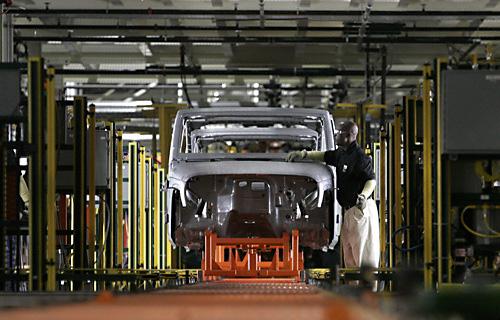Union members could strike Wednesday at Chrysler

A worker inspects a Jeep on the assembly line at the Daimler Chrysler Jeep plant in Toledo, Ohio in this Aug. 28, 2006 file photo. Contract talks, spurred by strike threats, may put hundreds out of jobs at Chrysler plants. THE ASSOCIATED PRESS, MADALYN RUGGIERO
October 9, 2007
DETROIT – If there was a script that automakers were supposed to follow for UAW contract talks, Chrysler seems to have overlooked it.
As negotiations continued Monday at Chrysler LLC’s Auburn Hills, Mich., headquarters, the United Auto Workers set a deadline of Wednesday morning to agree on a new contract, or else workers could strike.
The deadline may be a tactic the union is using to squeeze some more concessions from the company. It also may be that Chrysler isn’t just going to agree to the same terms that General Motors Corp. did last week just because that’s how it’s traditionally done.
Chrysler’s needs are different from GM’s requirements, analysts said, so a deal requires cost cuts in different places.
The union may have set the strike deadline for its 49,000 hourly workers because of how far Chrysler wants to push for cost cuts.
Get The Daily Illini in your inbox!
“We think that they may be holding out for something more than GM got,” said Aaron Bragman, an industry analyst for the consulting firm Global Insight.
The UAW went on strike for nearly two days last month before coming to a tentative agreement with GM on Sept. 26. Workers with the nation’s largest automaker are expected to wrap up voting on the agreement by Wednesday.
The union normally settles with one U.S. automaker and then uses that deal as a pattern for an agreement with the other two.
Among the differences this time, analysts say, are health care givebacks granted to GM and Ford Motor Co. in 2005 that Chrysler didn’t get, worth approximately $340 million a year.
A person briefed on the negotiations said the two sides have not agreed on giving the same deal to Chrysler. The person requested anonymity because the talks are private.
Higher health care costs are one big reason why Chrysler pays its workers an average of $75.86 per hour in wages, pension and health care costs, the highest among the Detroit automakers.
Several analysts also said the company and union likely are apart on setting up a Chrysler-funded union-run trust that would take on the company’s roughly $18 billion in retiree health care costs. Unlike GM, Chrysler also may be against giving specific job security promises by guaranteeing new cars and trucks will be built at U.S. factories, and it wants to hire out parts transportation rather than pay full UAW wages for it, the analysts said.
Job security could be a tough issue because Chrysler and its new owner, Cerberus Capital Management LP, would be reluctant to commit to huge investments when the company is looking at potentially cutting some models, said David Cole, chairman of the Center for Automotive Research in Ann Arbor.
As a bargaining chip, Chrysler could back off from new factory investments that it has announced and make them contingent on a new agreement, Cole said.
UAW President Ron Gettelfinger traded job security to GM for taking on the retiree health care costs and for a limited lower pay scale for new hires.
Chrysler has to be able to outsource its parts transportation because its competitors do for much lower costs, Cole said.
“They just can’t sustain that, so there will have to be buyouts,” he said.
Cerberus, a private equity firm, probably doesn’t want to put too much cash into the trust fund because it wants to turn Chrysler around and sell it, Bragman said.
“They don’t necessarily want to contribute a large amount of money to a long-term solution when Cerberus is more than likely a short-term owner,” Bragman said.
Chrysler spokeswoman Michele Tinson would not comment on specifics of the talks other than to say that they are progressing. UAW spokesman Roger Kerson also would not comment.
All three U.S.-based automakers have said they want to significantly close or eliminate a roughly $25-per-hour cost gap with Japanese automakers that have U.S. factories.
Cole said the strike talk could be drama to help get the pact ratified later by the membership. If there is a strike, he expected it to be short.
At the company’s Newark, Del., assembly plant, workers were taking the possibility seriously Monday by starting to staple together picket signs, said Richard McDonaugh Jr., president of Local 1183.
“No one wants to strike, but sometimes it’s the cost of doing business,” said McDonaugh, whose plant is scheduled to be idled in December 2009 if it doesn’t get a new product.
The last time the UAW struck two companies during the same set of negotiations was in 1976, according to Chrysler’s fact book on the bargaining. The union walked out of Ford plants for 28 days in September and October, and for 12 hours at 16 key GM locations.
A short-term strike might not hurt Chrysler much. Five U.S. plants were scheduled to be shut down during the next two weeks due to lower market demand for their products.A short strike would have little effect on the company, which has sufficient inventory to continue selling most vehicles, said Jesse Toprak, chief economist for the auto research site Edmunds.com.






